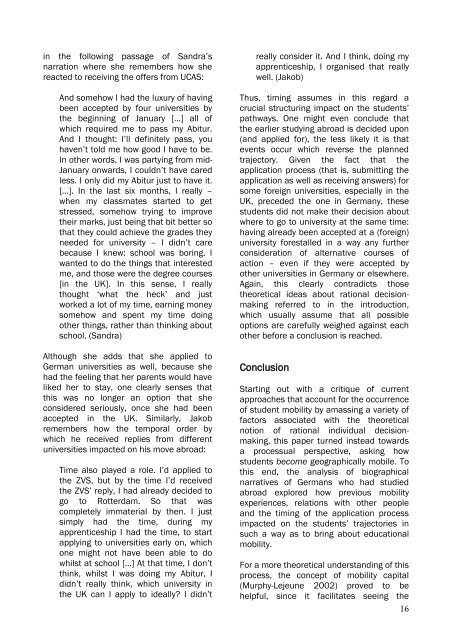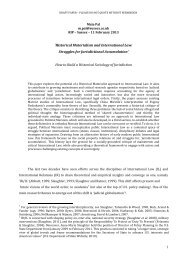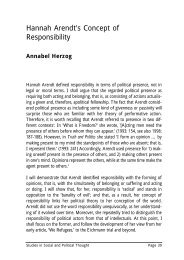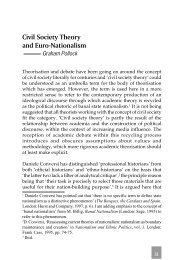Just a Matter of Choice? Student Mobility as - University of Sussex
Just a Matter of Choice? Student Mobility as - University of Sussex
Just a Matter of Choice? Student Mobility as - University of Sussex
You also want an ePaper? Increase the reach of your titles
YUMPU automatically turns print PDFs into web optimized ePapers that Google loves.
in the following p<strong>as</strong>sage <strong>of</strong> Sandra‟s<br />
narration where she remembers how she<br />
reacted to receiving the <strong>of</strong>fers from UCAS:<br />
And somehow I had the luxury <strong>of</strong> having<br />
been accepted by four universities by<br />
the beginning <strong>of</strong> January […] all <strong>of</strong><br />
which required me to p<strong>as</strong>s my Abitur.<br />
And I thought: I‟ll definitely p<strong>as</strong>s, you<br />
haven‟t told me how good I have to be.<br />
In other words, I w<strong>as</strong> partying from mid-<br />
January onwards, I couldn‟t have cared<br />
less. I only did my Abitur just to have it.<br />
[…]. In the l<strong>as</strong>t six months, I really –<br />
when my cl<strong>as</strong>smates started to get<br />
stressed, somehow trying to improve<br />
their marks, just being that bit better so<br />
that they could achieve the grades they<br />
needed for university – I didn‟t care<br />
because I knew: school w<strong>as</strong> boring. I<br />
wanted to do the things that interested<br />
me, and those were the degree courses<br />
[in the UK]. In this sense, I really<br />
thought „what the heck‟ and just<br />
worked a lot <strong>of</strong> my time, earning money<br />
somehow and spent my time doing<br />
other things, rather than thinking about<br />
school. (Sandra)<br />
Although she adds that she applied to<br />
German universities <strong>as</strong> well, because she<br />
had the feeling that her parents would have<br />
liked her to stay, one clearly senses that<br />
this w<strong>as</strong> no longer an option that she<br />
considered seriously, once she had been<br />
accepted in the UK. Similarly, Jakob<br />
remembers how the temporal order by<br />
which he received replies from different<br />
universities impacted on his move abroad:<br />
Time also played a role. I‟d applied to<br />
the ZVS, but by the time I‟d received<br />
the ZVS‟ reply, I had already decided to<br />
go to Rotterdam. So that w<strong>as</strong><br />
completely immaterial by then. I just<br />
simply had the time, during my<br />
apprenticeship I had the time, to start<br />
applying to universities early on, which<br />
one might not have been able to do<br />
whilst at school [...] At that time, I don‟t<br />
think, whilst I w<strong>as</strong> doing my Abitur, I<br />
didn‟t really think, which university in<br />
the UK can I apply to ideally? I didn‟t<br />
really consider it. And I think, doing my<br />
apprenticeship, I organised that really<br />
well. (Jakob)<br />
Thus, timing <strong>as</strong>sumes in this regard a<br />
crucial structuring impact on the students‟<br />
pathways. One might even conclude that<br />
the earlier studying abroad is decided upon<br />
(and applied for), the less likely it is that<br />
events occur which reverse the planned<br />
trajectory. Given the fact that the<br />
application process (that is, submitting the<br />
application <strong>as</strong> well <strong>as</strong> receiving answers) for<br />
some foreign universities, especially in the<br />
UK, preceded the one in Germany, these<br />
students did not make their decision about<br />
where to go to university at the same time:<br />
having already been accepted at a (foreign)<br />
university forestalled in a way any further<br />
consideration <strong>of</strong> alternative courses <strong>of</strong><br />
action – even if they were accepted by<br />
other universities in Germany or elsewhere.<br />
Again, this clearly contradicts those<br />
theoretical ide<strong>as</strong> about rational decisionmaking<br />
referred to in the introduction,<br />
which usually <strong>as</strong>sume that all possible<br />
options are carefully weighed against each<br />
other before a conclusion is reached.<br />
Conclusion<br />
Starting out with a critique <strong>of</strong> current<br />
approaches that account for the occurrence<br />
<strong>of</strong> student mobility by am<strong>as</strong>sing a variety <strong>of</strong><br />
factors <strong>as</strong>sociated with the theoretical<br />
notion <strong>of</strong> rational individual decisionmaking,<br />
this paper turned instead towards<br />
a processual perspective, <strong>as</strong>king how<br />
students become geographically mobile. To<br />
this end, the analysis <strong>of</strong> biographical<br />
narratives <strong>of</strong> Germans who had studied<br />
abroad explored how previous mobility<br />
experiences, relations with other people<br />
and the timing <strong>of</strong> the application process<br />
impacted on the students‟ trajectories in<br />
such a way <strong>as</strong> to bring about educational<br />
mobility.<br />
For a more theoretical understanding <strong>of</strong> this<br />
process, the concept <strong>of</strong> mobility capital<br />
(Murphy-Lejeune 2002) proved to be<br />
helpful, since it facilitates seeing the<br />
16

















